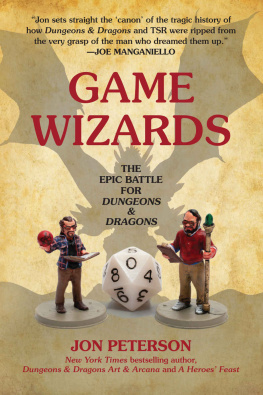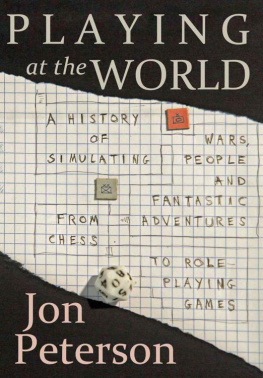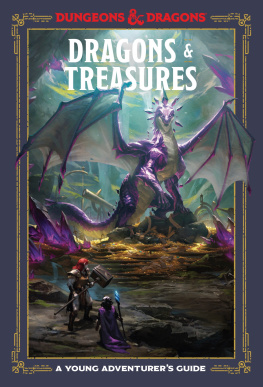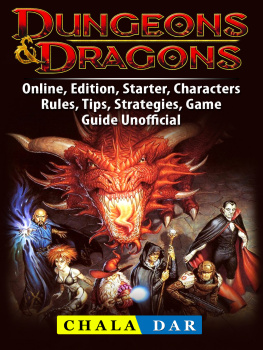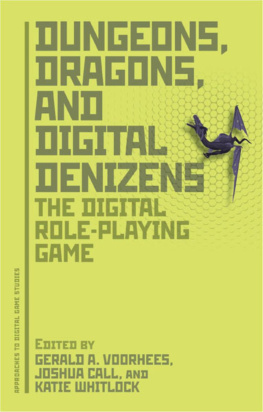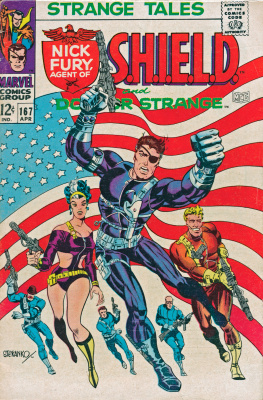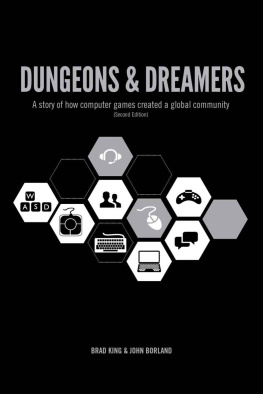Contents
Guide
Pagebreaks of the print version
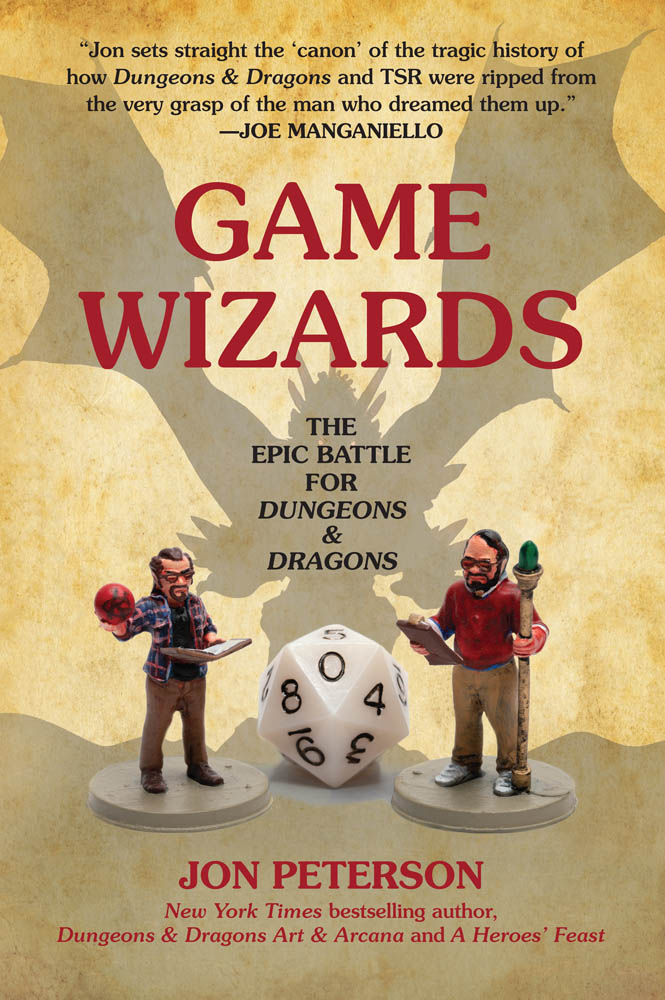
Game Histories
edited by Henry Lowood and Raiford Guins
Debugging Game History: A Critical Lexicon, edited by Henry Lowood and Raiford Guins, 2016
Zones of Control: Perspectives on Wargaming, edited by Pat Harrigan and Matthew Kirschenbaum, 2016
Gaming the Iron Curtain: How Teenagers and Amateurs in Communist Czechoslovakia Claimed the Medium of Computer Games, Jaroslav velch, 2018
The Elusive Shift: How Role-Playing Games Forged Their Identity, Jon Peterson, 2020
Homebrew Gaming and the Beginnings of Vernacular Digitality, Melanie Swalwell, 2021
Game Wizards: The Epic Battle for Dungeons & Dragons, Jon Peterson, 2021
Game Wizards
The Epic Battle forDungeons & Dragons
Jon Peterson
The MIT Press
Cambridge, Massachusetts
London, England
2021 Massachusetts Institute of Technology
All rights reserved. No part of this book may be reproduced in any form by any electronic or mechanical means (including photocopying, recording, or information storage and retrieval) without permission in writing from the publisher.
The MIT Press would like to thank the anonymous peer reviewers who provided comments on drafts of this book. The generous work of academic experts is essential for establishing the authority and quality of our publications. We acknowledge with gratitude the contributions of these otherwise uncredited readers.
Library of Congress Cataloging-in-Publication Data
Names: Peterson, Jon, author.
Title: Game wizards : the epic battle for Dungeons & Dragons / Jon Peterson.
Other titles: Dungeons and Dragons
Description: Cambridge, Massachusetts : The MIT Press, [2021] | Series: Game histories | Includes bibliographical references and index.
Identifiers: LCCN 2020047264 | ISBN 9780262542951 (Paperback)
Subjects: LCSH: Dungeons and Dragons (Game)--History. | TSR, Inc.--History. | Gygax, Gary. | Arneson, Dave, 19472009.
Classification: LCC GV1469.6 .P483 2021 | DDC 793.93--dc23
LC record available at https://lccn.loc.gov/2020047264
d_r0
No inventor can be a man of business, you know.
Little Dorrit
Contents
List of Figures
Series Foreword
What might histories of games tell us not only about the games themselves but also about the people who play and design them? We think that the most interesting answers to this question will have two characteristics. First, the authors of game histories who tell us the most about games will ask big questions. For example, how do game play and design change? In what ways is such change inflected by societal, cultural, and other factors? How do games change when they move from one cultural or historical context to another? These kinds of questions forge connections to other areas of game studies, as well as to history, cultural studies, and technology studies.
The second characteristic we seek in game-changing histories is a wide-ranging mix of qualities partially described by terms such as diversity, inclusiveness, and irony. Histories with these qualities deliver interplay of intentions, users, technologies, materials, places, and markets. Asking big questions and answering them in creative and astute ways strikes us as the best way to reach the goal of not an isolated, general history of games but rather of a body of game histories that will connect game studies to scholarship in a wide array of fields. The first step, of course, is producing those histories.
Game Histories is a series of books that we hope will provide a homeor maybe a launch padfor the growing international research community whose interest in game history rightly exceeds the celebratory and descriptive. In a line, the aim of the series is to help actualize critical historical study of games. Books in this series will exhibit acute attention to historiography and historical methodologies, while the series as a whole will encompass the wide-ranging subject matter we consider crucial for the relevance of historical game studies. We envisage an active series with output that will reshape how electronic and other kinds of games are understood, taught, and researched, as well as broaden the appeal of games for the allied fields such as history of computing, history of science and technology, design history, design culture, material culture studies, cultural and social history, media history, new media studies, and science and technology studies.
The Game Histories series will welcome but not be limited to contributions in the following areas:
- Multidisciplinary methodological and theoretical approaches to the historical study of games.
- Social and cultural histories of play, people, places, and institutions of gaming.
- Epochal and contextual studies of significant periods influential to and formative of games and game history.
- Historical biography of key actors instrumental in game design, development, technology, and industry.
- Games and legal history.
- Global political economy and the games industry (including indie games).
- Histories of technologies pertinent to the study of games.
- Histories of the intersections of games and other media, including such topics as game art, games and cinema, and games and literature.
- Game preservation, exhibition, and documentation, including the place of museums, libraries, and collectors in preparing game history.
- Material histories of game artifacts and ephemera.
Henry Lowood, Stanford University
Raiford Guins, Indiana University Bloomington
Preface
The very first edition of Dungeons & Dragons credits two people on its cover: E. Gary Gygax (19382008) and David L. Arneson (19472009). As the game appeared well within living memory, and quickly found its place in popular culture, it should be straightforward to say what exactly those two people had to do with its creation and popularization. With the half-century anniversary of D&Ds 1974 release approaching, this pen-and-paper tabletop game is, to the surprise of nearly everyone, more popular and influential than ever, which makes its genesis a subject of growing interest. But sometimes, circumstances conspire to make even recent history difficult to recover.
Part of the problem is that the events leading up to the publication of D&D did not seem especially momentous at the time. The process involved only a handful of people working within an esoteric hobby, which left little by way of paperwork and few memorable moments. It is hard to imagine a project less obviously destined for mainstream success than D&Dand the shock of its triumph did more to disturb its historical record than clarify it. Gygax and Arneson had a falling out a few years after the games release, and their scuffle over money and credit kicked up dust that obscures the key historical particulars to this day.
This book is the story of how D&D rose from its humble origins to become a pop culture phenomenon, and what that remarkable journey did to the people who made it. It does not focus on the innovations in game design of D&D, nor does it dwell on questions of who invented which conceptsexcept in so far as those details became part of the public or legal dispute over the game, which in a few cases they did. Readers interested in game system evolution are directed to my book


